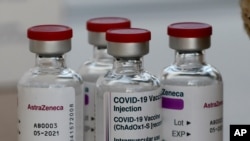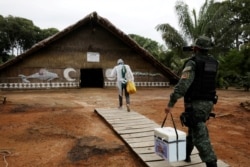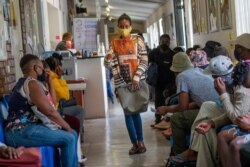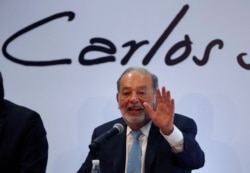The first COVID-19 shots are one step closer for low- and middle-income countries that have been left out of vaccine delivery as wealthier countries snapped up available supplies.
The World Health Organization's scientific advisers on Wednesday recommended authorizing a vaccine developed by the University of Oxford and drugmaker AstraZeneca.
COVAX, a WHO-co-led organization aimed at distributing shots equitably worldwide, is set to deliver 336 million doses of this vaccine to 145 countries once the organization gives the green light. The nod is expected following meetings on February 12 and 15.
New data about that vaccine are complicating the rollout, however.
In South Africa, where a new, more contagious variant has arisen, a study found that patients who got the AstraZeneca shot remained susceptible to mild or moderate cases of COVID-19.
The study did not assess whether the vaccine lost potency against more severe illness. Scientists still expect the vaccine keeps people out of the hospital and out of the grave, which they note is the most important reason to get inoculated.
But the results led the South African health ministry to scale back its own rollout of the AstraZeneca vaccine while it collects more data.
Nevertheless, the WHO's Strategic Advisory Group of Experts on Immunization on Wednesday recommended going ahead with the shot.
"Even if there is a reduction" in efficacy, panel chair Alejandro Cravioto noted at a press briefing, "there is no reason not to recommend its use, even in countries that have the circulation of the variant," because the benefits far outweigh the drawbacks.
Alternative to competition
The AstraZeneca vaccine makes up the largest part of the COVAX portfolio by far at the moment. The only other vaccine approved for COVAX is Pfizer-BioNTech's, but only 1.2 million doses are available in the first part of this year.
AstraZeneca's shots are a better fit for many low- and middle-income countries. They cost a fraction of what Pfizer's do, and they can be stored at refrigerator temperatures, rather than the extreme cold required for Pfizer's doses.
As the wealthiest countries began scrambling to lock down vaccine supplies last year, COVAX was developed as an alternative. Rather than competing against each other, countries would pool their resources so that COVAX could secure supplies for all of them equitably.
Things haven't quite gone as planned. Countries with the resources to do so have continued to make one-on-one deals with vaccine makers, soaking up limited supplies.
Ten countries account for 75% of the vaccine doses distributed worldwide so far.
"Meanwhile, almost 130 countries, with 2.5 billion people, have yet to administer a single dose," WHO Director-General Tedros Adhanom Ghebreyesus noted Monday.
As the pandemic rages out of control, the virus has ample opportunity to mutate into more variants and further undermine the vaccines.
"Until we end the pandemic everywhere, we will not end it anywhere," Tedros said. "This is not an empty slogan, it is a hard reality."
Added complexity
Vaccine makers are adapting their products to the new variants. But having to deliver vaccines against an evolving microbe has "increased the complexity of vaccination by an order of magnitude," said Krishna Udayakumar, founding director of the Duke University Global Health Innovation Center.
"It's not just one vaccine and you're OK," he said. "You're going to need seasonal vaccines for most of the world for the foreseeable future. We're talking about major investments in everything from manufacturing to supply chains to human capital to make sure we have the workforce."
Lower-income countries could lose out on the next round of vaccines, experts warn.
"We're going to see the same cycle again," said Northeastern University law professor Brook Baker, senior policy analyst at the Health Global Access Project. "The rich countries will run to the front of the line for the new variant vaccines. And countries will be left behind again as petri dishes for new variants to develop."
And the cycle could repeat, until manufacturing capacity catches up with demand.
Companies should be letting go of patent rights and allowing manufacturers in many more countries to make their products, Baker said.
South Africa and India have a proposal at the World Trade Organization to waive intellectual property rights for the duration of the pandemic.
That might not help in the short term.
"There is not a lot of idle capacity that we've been able to track down," Udayakumar said.
In the long run, however, governments or donors might be willing to build more factories in the next year or so if those rights were waived, he said.
Scaling up
Drug companies already have been scaling up manufacturing on their own and with public and private help, Udayakumar said. The Bill and Melinda Gates Foundation helped the Serum Institute of India expand production, and Mexican billionaire Carlos Slim pitched in to increase vaccine manufacturing in Mexico and Argentina.
Companies without vaccines in the pipeline are offering their facilities to their rivals. Novartis and Sanofi have signed agreements to manufacture Pfizer's vaccine.
"It's been tremendous to see competitors come into the space and say, 'I will provide additional manufacturing capacity,' " said Harvard Medical School professor Rebecca Weintraub, director of the Better Evidence project at Harvard-affiliated Ariadne Labs.
Vaccines from more companies are on the way. Novavax and Johnson & Johnson have recently reported positive results. They should help boost global vaccine access. Both have committed hundreds of millions of doses to COVAX.
But in a world of 7.8 billion people, many will go unvaccinated for the foreseeable future.
Other vaccines are in development around the world. For those that get marketing approval, "we would really ask that manufacturers make WHO their next stop," Kate O’Brien, director of the WHO Department of Immunization, Vaccines and Biologicals, said Wednesday at a press briefing.
"[COVAX] is the only global mechanism that we have for fairly and equitably distributing vaccines," she said.












